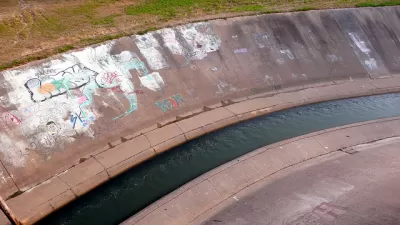Adam Krantz, who leads the National Association of Clean Water Agencies, breaks down how the Trump Administration infrastructure plan would impact local water infrastructure.

After an in-depth review of the administration's proposed infrastructure finance plan, National Association of Clean Water Agencies CEO Adam Krantz concludes: "Ultimately, this is not going to save municipalities money. It’s going to require municipalities to raise more money—more capital and more investment dollars—to do large new projects."
In The Planning Report, Krantz highlights the positives the plan offers for the water sector. For one, it makes water a clearly defined priority in national infrastructure—"something we haven't seen before."
For another, it encourages collaboration and innovation: "The administration's overlay of innovation is a good thing, and should stay part of any bill."
But core elements of the proposal are troubling to the water agencies represented by NACWA: the additional burden on municipalities to raise capital, the limited amount of funding available, and the emphasis on beginning bold new projects rather than meeting existing infrastructure needs. What municipalities need instead, Krantz argues, is more direct federal spending—a goal he hopes can be achieved in Congress by marrying the administration's push for private partnerships with the funding model proposed by alternative bills.
Krantz's full analysis can be found in The Planning Report.
FULL STORY: White House’s “Jump Ball” Infrastructure Financing Plan: Unpacking Its Impact on Water Projects

Planetizen Federal Action Tracker
A weekly monitor of how Trump’s orders and actions are impacting planners and planning in America.

Maui's Vacation Rental Debate Turns Ugly
Verbal attacks, misinformation campaigns and fistfights plague a high-stakes debate to convert thousands of vacation rentals into long-term housing.

San Francisco Suspends Traffic Calming Amidst Record Deaths
Citing “a challenging fiscal landscape,” the city will cease the program on the heels of 42 traffic deaths, including 24 pedestrians.

Amtrak Rolls Out New Orleans to Alabama “Mardi Gras” Train
The new service will operate morning and evening departures between Mobile and New Orleans.

The Subversive Car-Free Guide to Trump's Great American Road Trip
Car-free ways to access Chicagoland’s best tourist attractions.

San Antonio and Austin are Fusing Into one Massive Megaregion
The region spanning the two central Texas cities is growing fast, posing challenges for local infrastructure and water supplies.
Urban Design for Planners 1: Software Tools
This six-course series explores essential urban design concepts using open source software and equips planners with the tools they need to participate fully in the urban design process.
Planning for Universal Design
Learn the tools for implementing Universal Design in planning regulations.
Heyer Gruel & Associates PA
JM Goldson LLC
Custer County Colorado
City of Camden Redevelopment Agency
City of Astoria
Transportation Research & Education Center (TREC) at Portland State University
Jefferson Parish Government
Camden Redevelopment Agency
City of Claremont





























